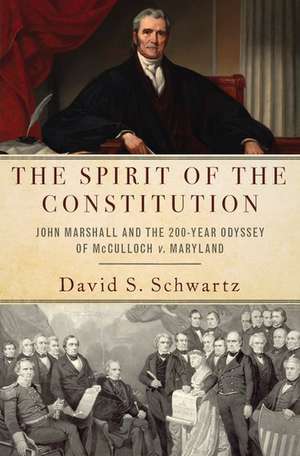The Spirit of the Constitution: John Marshall and the 200-Year Odyssey of McCulloch v. Maryland
Autor David S. Schwartzen Limba Engleză Hardback – 24 oct 2019
| Toate formatele și edițiile | Preț | Express |
|---|---|---|
| Paperback (1) | 162.55 lei 10-16 zile | |
| Oxford University Press – 5 oct 2021 | 162.55 lei 10-16 zile | |
| Hardback (1) | 250.62 lei 10-16 zile | |
| Oxford University Press – 24 oct 2019 | 250.62 lei 10-16 zile |
Preț: 250.62 lei
Preț vechi: 291.42 lei
-14% Nou
Puncte Express: 376
Preț estimativ în valută:
47.95€ • 50.07$ • 39.69£
47.95€ • 50.07$ • 39.69£
Carte disponibilă
Livrare economică 04-10 martie
Preluare comenzi: 021 569.72.76
Specificații
ISBN-13: 9780190699482
ISBN-10: 0190699485
Pagini: 344
Dimensiuni: 236 x 155 x 33 mm
Greutate: 0.61 kg
Editura: Oxford University Press
Colecția OUP USA
Locul publicării:New York, United States
ISBN-10: 0190699485
Pagini: 344
Dimensiuni: 236 x 155 x 33 mm
Greutate: 0.61 kg
Editura: Oxford University Press
Colecția OUP USA
Locul publicării:New York, United States
Notă biografică
David S. Schwartz is Professor of Law at the University of Wisconsin Law School. He teaches and writes in the areas of Constitutional Law, Evidence and Civil Procedure. His scholarship includes articles published in the Georgetown, Notre Dame, and University of Pennsylvania law reviews, and he has co-authored two casebooks: Constitutional Law: a Context and Practice Casebook (with Lori A. Ringhand) and An Analytical Approach to Evidence: Text, Problems and Cases (with Allen, Swift, Pardo & Stein).
Recenzii
David Schwartz has written an indispensable study of the single most important Supreme Court case in the canon. As such, he delineates not only the meaning and importance of the case in 1819, but also the use made of it over the next two centuries as it became a central myth and symbol of the very meaning of American constitutionalism.
With compelling clarity, David Schwartz uses the many re-interpretations of McCulloch v. Maryland to illuminate the whole arc of American constitutional development, and draws a surprising but vital conclusion: it is wiser to look to the precedents set by elected legislative and executive officials, as well as our current needs, to decide what our constitutional system requires to fulfill its great goals-rather than asking 'what would John Marshall do?'
Professor Schwartz brilliantly shows that courts and scholars have gotten Chief Justice Marshall's famous opinion in McCulloch v Maryland wrong and misunderstood its role in the Court's history. This remarkable work of history is a must-read for anyone interested in constitutional law because Schwartz's findings should have profound consequences for Supreme Court decisionmaking in areas ranging from health care to federalism to civil rights. This is a major contribution.
Professor Schwartz's book challenges the thinking of those who believe that the towering Marshall Court decision in McCulloch v. Maryland stands for legal principles that are clear and specific. It carefully explores the ambiguities in the Court's opinion and, in the process, illuminates some of the most fundamental problems-too often slighted or denied-of American constitutionalism. It is particularly valuable in its convincing demonstration of the impact that slavery had on the development of Commerce Clause jurisprudence, especially when that influence was not immediately apparent in the cases and often neither acknowledged nor recognized by the formal law.
With compelling clarity, David Schwartz uses the many re-interpretations of McCulloch v. Maryland to illuminate the whole arc of American constitutional development, and draws a surprising but vital conclusion: it is wiser to look to the precedents set by elected legislative and executive officials, as well as our current needs, to decide what our constitutional system requires to fulfill its great goals-rather than asking 'what would John Marshall do?'
Professor Schwartz brilliantly shows that courts and scholars have gotten Chief Justice Marshall's famous opinion in McCulloch v Maryland wrong and misunderstood its role in the Court's history. This remarkable work of history is a must-read for anyone interested in constitutional law because Schwartz's findings should have profound consequences for Supreme Court decisionmaking in areas ranging from health care to federalism to civil rights. This is a major contribution.
Professor Schwartz's book challenges the thinking of those who believe that the towering Marshall Court decision in McCulloch v. Maryland stands for legal principles that are clear and specific. It carefully explores the ambiguities in the Court's opinion and, in the process, illuminates some of the most fundamental problems-too often slighted or denied-of American constitutionalism. It is particularly valuable in its convincing demonstration of the impact that slavery had on the development of Commerce Clause jurisprudence, especially when that influence was not immediately apparent in the cases and often neither acknowledged nor recognized by the formal law.
